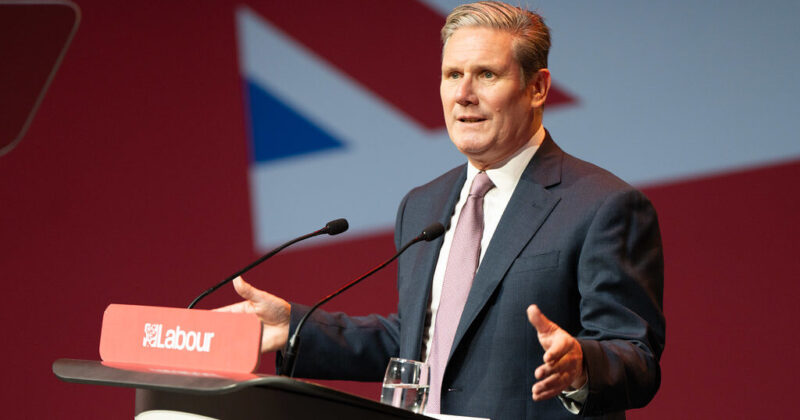

By Peter Main
With little over a year before an election has to be called, and possibly less than that to prepare, both Tories and Labour have moved into election mode. The party conferences, which began the political year, gave some clues to their strategies and priorities.
For the Tories, Rishi Sunak’s priority was to appeal to the members of his own party, who rejected him in favour of Liz Truss when given the choice. As a result, other ministers were sidelined, with no policy initiatives to announce, while he concentrated on condemning policies, like councils controlling where people can shop, which no one is proposing. His big headliner, cancelling HS2 to Manchester, not only confirmed the chaos 13 years of Tory government have brought to this country, but also underlined its lack of democracy. One man, never elected to office, can decide, without any consultation even with his own government, never mind the towns and cities affected, to cancel a project on which billions have already been spent!
Clearly, for the majority of Tories, the year ahead is a preparation, like the conference, for the factional battles after their expected electoral defeat, whenever it comes.
Keir Starmer also has a problem with the membership of his party. He stood for election as their leader promising to stick to the policies that nearly brought Corbyn victory in 2017. Once elected, he set about rejecting all of them. In order to ensure an appreciative audience at the conference, members who might disagree with him were prevented from attending. In their place, observers from business and finance were invited, almost outnumbering constituency delegates. Beyond the conference, it was to business interests that Labour was speaking, not to the electorate. It was arranged for Mark Carney, former Governor of the Bank of England, to endorse Rachel Reeves as a “serious economist” to reassure the City their money would be safe in her hands—providing she has access to Wikipedia, it seems.
The big policy takeaway was that a Starmer government would stick to the spending limits laid down by Jeremy Hunt while encouraging investment in sectors that have been neglected for a decade and more because of Tory infighting. Business has no objection to that. The formula of expecting four pounds of private investment for every one pound of state spending is another version of the Private Finance Initiative and Public Private Partnership schemes and actually means further privatisation, most noticeably in the NHS. Wes Streeting’s brilliant idea of clearing the waiting lists by encouraging overtime, when the whole health sector is facing burn out, shows how far he is from any serious policy or, perhaps, how far he is from saying in public what he really intends.
Strategy
Labour’s strategy is to rely on Tory unpopularity, appeal to big business and its media with policies that reward them and take its own members and the broader electorate for granted. The short-sightedness of that is already becoming clear with the glaring contradiction between Starmer’s abject support for anything Israeli and the long-standing support for the Palestinian cause in both the party membership and a substantial part of its electors. The coming year will, without doubt, weaken that strategy even further. For now, it is probably still true that a majority of working class voters see Labour as, at least, the lesser evil in comparison to the Tories. If that remains the case, then only the experience of another pro-business Labour government could break the political and organisational links that tie them to Labour.
What is already clear, however, is that the best preparation for future battles is effective tactics in today’s battles, and that means no holding back against the Tories or ‘waiting for Labour’.